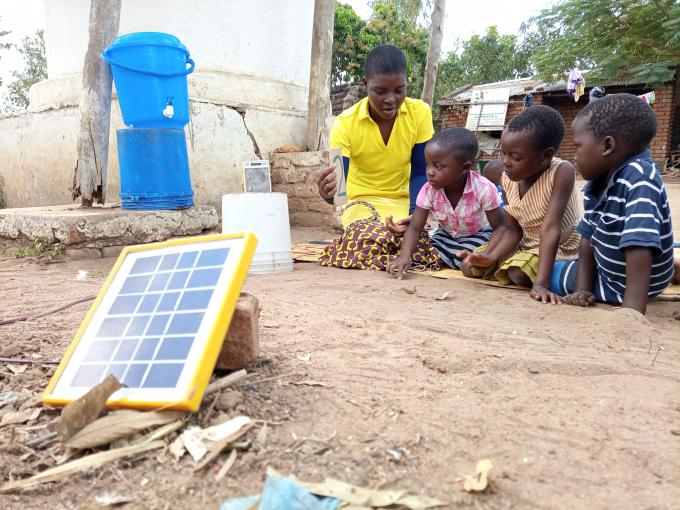Radio Programme Keeps Learning Alive Amid COVID-19

In a small homestead in Jali, in the deepest parts of rural Zomba District in southern Malawi, Emily Leston conducts an afternoon class with four pupils, taking them through their paces.
But Leston is not a teacher. She is a housewife who has transformed her patio into an improvised classroom, thanks to Save the Children Instructive Radio Instruction (IRI) project
Malawi government announced the closure of schools on 23rd March 2020 due to the COVID-19 pandemic.
To this effect, Save the Children adapted the IRI concept which was initially being used in Sponsorship Programme to ensure continuity of learning among all Early Childhood Development Learners. IRI has been embraced as part of the national response and it is covering all the 12,000 Community Based Child Care Centers in Malawi with active support of all ECD partners including Ministry of Gender, UNICEF and ActionAid. Save the Children provides weekly progress reports to the National Education Cluster.
“This programme has helped in a very big way in the sense that when the kids were out of school, you could tell that they were slowly forgetting what they had learnt in class,” the mother of three says.
Leston, who teaches two of her own children and two of her neighbours’ (as they have no radio in their home) on a daily basis, adds that when the programme started, the primary goal was to refresh the learners’ memories.
“The idea was to capture what they had learnt so that they felt like they are back in class. So that even when they go back to school, they will be fresh,” she says.
All the four learners attend a local Early Childhood Development (ECD) community-based childcare centre (CBCC). The radio programme specifically targets this group as they prepare to enroll into the first class of primary school.
Shakir Malemba is a caregiver at Nkhundi CBBC and coordinator of the radio programme in the area.
She notes what is encouraging about the home-schooling via radio is how the parents have embraced the initiative.
“They are able to do that without the aid of a caregiver. They just tune in the radio station and follow the instructions.
“What they are learning in the homes is the same things that we teach them in the CBCCs so when CBCCs resume, it will be like the schools were never closed,” she says.
Save the Children, launched IRI in 2013 after noting that most of the caregivers in the CBCCs were not well trained.
“The idea was to have pre-recorded ECD lessons recorded by people who are aware of the learning standards and curriculum with the intention of making sure that when they are being broadcast, the caregivers also had the means for mastering the way to teach ECD. IRI has come in handy after the Covid-19 pandemic stuck. We have adapted to embrace learning in the home,” Says. Lexon Ndalama, senior technical advisor for education and child development at Save the Children.
Ndalama notes that the adaptation is working well.
“IRI is working effectively because children are attracted to attend because of the radio.
“The idea is to ensure continuity of learning. Education cannot wait. And in early child development, learning is crucial for a child to develop holistically. IRI is ensuring children don’t miss out,” he adds
With Support from Education Cannot Wait and in partnership with government the radio programmes are broadcast across Malawi every weekday on 8 radio stations. ActionAid Malawi is supporting broadcasting of the same programmes to an additional four radio stations. Together, Save the Children and ActionAid have directly reached 663,740 and indirectly 940,808 ECD learners. A separate programme giving instructions to parents is broadcast on Sundays.
 Malawi
Malawi